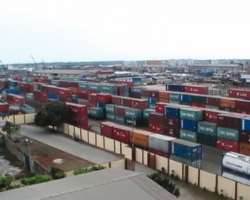Time To Unbundle Nigeria Customs Service

The new measures to ensure transparency in Nigeria Customs Service (NCS) took a new turn last week as the Comptroller-General, Col. Hameed Ibrahim Ali (Rtd) ordered officers of the agency to declare their assets. This drive toward effective public service delivery in NCS is a welcome development as it is pivotal and underscores the seriousness of President Muhammadu Buhari’s on-going fight against corruption in Nigeria.
Pivotal in the sense that it is nearing one decade since the Act establishing the Council for the Regulation of Freight Forwarding in Nigeria (CRFFN) came into force – a legislation that empowers CRFFN to regulate standards of training and certification for freight forwarding practicebut cedes licensing to NCS. Today, the freight forwarding reform machinery still appears to be in need of a lot more than a new spray of paint and, this development, experts have linked to unresolved jurisdictional issues between CRFFN and NCS.
Since inception in 1958, NCS has over the years developed into a monopoly overseeing a complex network of businesses ancillary to her core function as regulator, manager, and collector of duties of custom and excise for Nigeria. Besides, the unique role of the ports as gateway to the nation’s economy has further placed NCS at the hub of international supply chain of goods and services. Consequently, import, export, shipping, clearing, forwarding, haulage, and every other aspect of the business of shipping begin and end with NCS.For many years now, as is consistent with monopolies in Nigeria, operational atrophy in sub-unitscan be seen to have set in.
But the Federal Government initiative of 2003 was to reform the ports first in a bid to improve efficiency and reduce cost of doing business. The adoption of a landlord model resulted in the concessioning of all terminals and the unbundling of Nigerian Ports Authority (NPA). Following the reform, the Federal Government enacted the CRFFN Act in 2007 to address one component of the system that is most visibly lagging behind world best practices –Freight Forwarding.
Nigeria’s competitiveness in freight forwarding practice has continued to be in question as touts and miscreants make inroads into the industry, advancing corruption and sharp practices, depreciating the quality of service, eroding the confidence of importers and sundry other port users, and brazenly showing reluctance in subscribing to the education and training requirement as prescribed by CRFFN and accredited by the International Federation of Freight Forwarders (FIATA).
Recently, a gathering of operators of CRFFN accredited training centers,lamenting the low turnout of freight forwarding practitioners for training, have observed that the NCS is subtly and indirectly undermining the competitiveness of Nigerian freight forwarders by the failure of the agency to recognize and recommend CRFFN training and certification as prerequisite for licensing and ultimately for freight forwarding practice. The Federal Government is further shortchanging CRFFN by restricting the licensing responsibility to NCS. By the way, what is regulation without the power to determine who comes in and who goes out?
The case for training and certification is strong. By international standards, freight forwarding practice in Nigeria has lagged even as the number of practitioners has risen. The lack of professionalism of this army of touts invading Nigeria’s freight forwarding sub-sector is contributing largely to the congestion at the ports which evidently is impacting negatively on the clearing and movement of cargoes in our ports. But foreign companies engaged in the freight forwarding business in Nigeria are pulling ahead alarmingly.
The goal of CRFFN is a world-class industry qualification, modeled on the FIATA requirements for vocational training. CRFFN aims at determining the standards of knowledge and skill to be obtained by persons seeking to be registered as freight forwarders and raising those standards from time to time in accordance with international industry best practice. This provision encourages freight forwarders to strive for high level of career achievement and to gain a broader understanding of the principles of cargo movement in the interest of the public, clients, and employees.
The unbundling of NPA has impacted positively on the ports and by extension, the economy. One of its challenges though is the influx of human traffic around the ports. The Ports Security and Nigeria Police have employed different crowd control measures including raids but that has not dissuaded miscreants. The unbundling of NCS would add new impetus to the mandate of CRFFN to rid the ports of touts by enforcing training and certification as prerequisite for licensing and freight forwarding practice.
Chigozie Chikere
Chartered Member, Chartered Institute of Logistics & Transport (CILT) Nigeria,
e-mail: [email protected]
Phone: 08039504536
